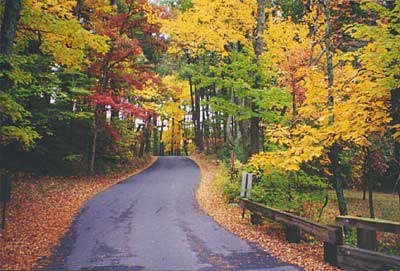 |
Return to index... |
OCTOBERDover, MassachusettsOld sneakers, jeans and a chamois shirt, I stop for coffee and then head out to meander the back roads of old New England. The foliage is extravagant, spectacular this year. It's as though all the staid personalities of the forest had let down their guard, like quiet and reserved old men gathering one last time and revealing their most youthful, colorful secrets. I'm out to revisit as well as visit. I play music that excavates an ancient fall roaming rural roads to Amherst, so that my experience is not only seeing and hearing colors, but remembering them. A collage of matted sight and sound. These lanes are lined with stone walls bordering old fields, the season advanced so that leaves float through the air. Solid old white farm houses and barns; old New England which is now wealthy New England. I sense an ageless mystery to it, a mysticism, like an old man lying on his death bed realizing the value of his life, where for so many years he only supported his branches, hardened his bark. Rueful realizations that for so long he could not see the forest for the trees. Now the forest demands his attention; he understands there's more to life than bark and bite, more than the one green color that mesmerized for so long. I choose a day that's not perfect, that's not a sunlit array, though the greatest memory I have of this is of an early snow whose whiteness partially obscured the color. It is a hallowed season, one that has challenged writers always. A sight such that you must use the best words for the colors; they are not red but crimson, not yellow but gold. It is the one season with more than one name; it is autumn. The best roads are those unkempt, overhung with branches, thin on the borders so that you can see into the forest, allowing a sense of the beauty's depth. The roads that show that it's not merely a facade, but something that's deep and true and thorough. A forest red with embarrassment that it's innermost weakness is becoming unveiled, a forest yellow with fear of winter's vulnerability, all of it unraveling a course well known, but little understood. It is not the cold that initiates the change, but the diminishing light of day. It's important to visit someone at their best, but it's important also to visit when they're at their worst. I've gone to the cemetery in a cold rain, because I know no one else will be there. Inconvenient, uncomfortable, shivering wet and chatting, attempting to assure that you travel this road in all seasons, not just the pretty one. A time when you stand alone, the wind through the eerie avenues your sole impatient companion. As I drive through the woods today, I think of visiting my mother on her raining, vacant hillside. In the blink of an eye it's been eight years; I'm afraid to blink again.
I will return when it's over, during the greys and whites of winter. A silent time when the naive are fooled into believing that all is lost. But now is the time of year when two entirely distinct life forms communicate one subtle message. Despite its prevalence in our literature, it's too valuable to dismiss as sentimental, or trite. The metaphor is eternally ingrained in New England's consciousness. It is the fall, and they are called leaves. To borrow an appropriate line from the music accompanying me -- to see my thought as well as hear it -- "the countryside is a land of rainbows, and a hundred thousand tears." |
 The best roads are the old, narrow winding ones that cross the Charles River back in the woods, the former cart paths where just before reaching the summit of a hill it appears as though you're in the tops of the trees, the very apex of glorious ruin, before the descent. The best roads are those that wind through fields and hills, revealing with each new turn an unexpected delight, a recently improvised variation of the now familiar theme.
The best roads are the old, narrow winding ones that cross the Charles River back in the woods, the former cart paths where just before reaching the summit of a hill it appears as though you're in the tops of the trees, the very apex of glorious ruin, before the descent. The best roads are those that wind through fields and hills, revealing with each new turn an unexpected delight, a recently improvised variation of the now familiar theme.